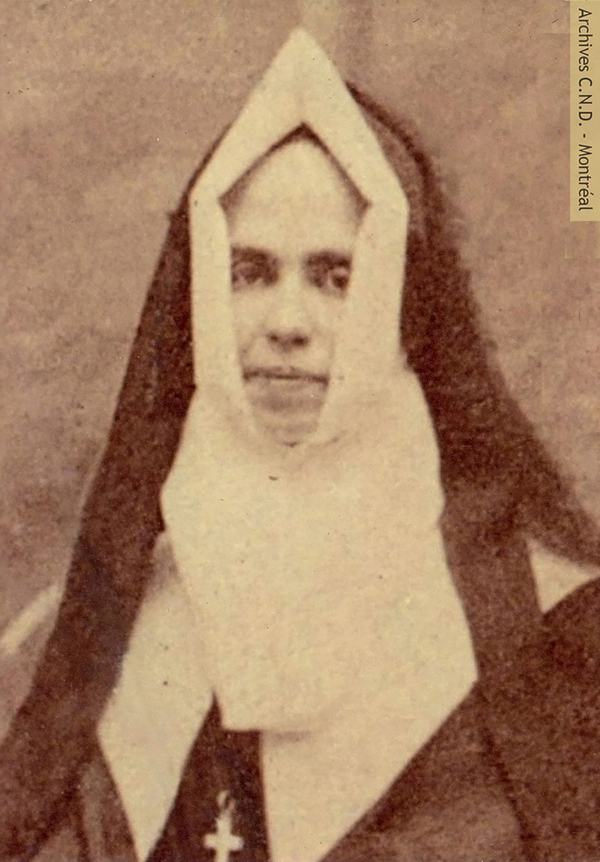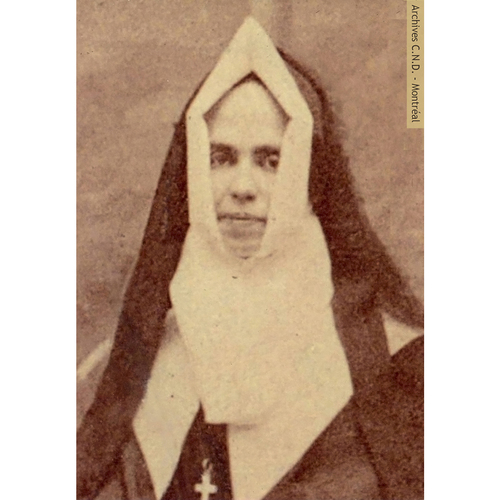
Source: Link
DUBUC, SOPHIE-LOUISE, named Saint-Jean de la Croix, sister of the Congregation of Notre-Dame, teacher, and superior general of the community; b. 24 Aug. 1826 in Montreal, eldest daughter of Jean (John) Dubuc, a druggist, and Sophie Guertin; d. there 14 Oct. 1908.
Sophie-Louise Dubuc attended the Académie de la Visitation in Montreal, which was run by the sisters of the Congregation of Notre-Dame. Her father joined the Patriotes in 1837 and ended up in prison, but he succeeded in escaping to Boston where his family joined him around 1839. There Sophie-Louise managed to learn English. In 1849 she entered the noviciate of the Congregation of Notre-Dame in Montreal. After making her vows on 21 Aug. 1851 she took the name Sister Saint-Jean de la Croix and received her first official order, which was to teach at the boarding-school in Yamachiche. Next she was sent as an English teacher to other boarding-schools, the Pensionnat Saint-Roch at Quebec in 1853 and subsequently the Pensionnat Villa-Maria in Montreal. In 1857 she went to Arichat, N.S., to found the first of the congregation’s houses in the Maritimes. Upon completion of this difficult mission she was appointed assistant mistress of the English-speaking novices at the noviciate in 1859, and then English teacher at Villa-Maria in 1861. In the space of ten years she had convinced her superiors of her varied talents and lively intelligence.
In 1864 Sister Saint-Jean de la Croix began assuming a lengthy series of responsibilities that would lead her to all the governing levels of the Congregation of Notre-Dame. Initially superior at Saint-Roch, she was behind the congregation’s decision to purchase Bellevue, an estate on the heights of Sainte-Foy owned by Thomas Gibb, in order to open a second boarding-school in the Quebec region. This intention, however, “caused great anxiety and serious fears in the communities dedicated to education,” according to Bishop Charles-François Baillargeon*, and marked the beginning of along controversy. Despite everything, Sister Saint-Jean de la Croix sought permission to go ahead by raising petitions among the public and alleging that the feared competition could only “give new impetus” to education, as it had in Montreal. But in August 1865 she met with a flat refusal from the coadjutor bishop. This episode was a manifestation of the intense rivalry that in the 19th century set the various teaching communities against one another in the “market” for educating girls, a rivalry in which episcopal protection was indispensable. Bellevue remained for the time being a house for those on vacation. From 1867 to 1869 Sister Saint-Jean de la Croix was in charge of organizing the Pensionnat Mont-Sainte-Marie in Montreal. Subsequently, when she went back to Saint-Roch, she took up the Bellevue project again, after Bishop Elzéar-Alexandre Taschereau* had lifted the ban on erecting a boarding-school there in 1872; in the end she carried out this undertaking in December 1873. Illness, however, prevented her from pursuing the initiative further.
After a brief period in 1875 as superior at the Académie Saint-Denis in Montreal, Sister Saint-Jean de la Croix went to run the Charlottetown mission for four years. Having become assistant general in 1880, she collaborated in the fourth superiorship of Mother Saint-Victor, which coincided with the building of an imposing mother house on Mount Royal in Montreal. In 1882, upon being appointed assistant to the superior at Quebec, she helped the congregation become more firmly established and visible in the diocese of Quebec, despite ongoing difficulties at Bellevue.
Elected superior general in 1885, Mother Saint-Jean de la Croix managed the constant growth of the congregation effectively. The number of sisters rose from 726 in 1882 to 1,002 in 1890, and the number of pupils from 10,331 to 15,723. She oversaw the building of seven houses in Quebec, three in the Maritimes, four in Ontario, and three in the United States, as well as the enlarging or rebuilding of twelve of the early houses, and, of course, the permanent work site that was the mother house on the mountain in Montreal. The trend toward growth, which had begun around 1850, seems to have reached its peak during her term as superior general. In fact, after 1891 the congregation moved instead towards diversifying the curriculum in its boarding-schools, teaching in the public schools, and developing its pedagogy. At the chapter in 1888 during her second term of office, Mother Saint-Jean de la Croix went ahead with the major reorganization of the congregation into canonical provinces, thus completing the process of regionalization begun in 1864. She also presided over the transfer to the mother house of the remains of the founder, Marguerite Bourgeoys*. In 1889 she learned that the steps to beatify Bourgeoys had been successfully concluded, and on 28 June the official decree of pontifical approval of the order’s rule reached her. In her administration she gave proof of the breadth of her thinking by her resort to symbolic measures as much as to decisions of an organizational kind.
None the less Mother Saint-Jean de la Croix did not neglect the internal management of the congregation. As technology advanced and the “spirit of the times” penetrated into the houses, in her administrative memoranda she multiplied the interpretations applicable to the rule. She stood out through her scrupulous attachment to the usages and customs of the community; for example she maintained the two-year requirement for the noviciate, despite the needs created by the expansion of the congregation.
After her term as general, Mother Saint-Jean de la Croix was put in charge of the small houses, in particular the one at Oka. She was at Oka in 1893 when she learned that the mother house on the mountain had burned down. “Beseech our dear father St Joseph, then, . . . to suggest . . . that a mother house simpler and smaller than the one we have lost be built,” she wrote to a correspondent at the time. In 1894 she was given the delicate mission of freeing the house in New York from the administrative interference of parish priest Frédéric Tétrault. Two years later she accepted the superiorship of the Académie Saint-Sauveur at Quebec, where she gained everyone’s affection and admiration. Having retired in 1903, she spent the last years of her life in the infirmary. She died on 14 Oct. 1908 in the new mother house on Rue Sherbrooke in Montreal, where she had moved several months earlier.
Sister Saint-Jean de la Croix was undoubtedly one of those remarkable women who have found in the religious life the opportunity to fulfil great responsibilities with extraordinary talent. Given her humble origins, her achievements seem even more exceptional.
The main records from Mother Saint-Jean de la Croix’s term of office as superior general were destroyed when the mother house of the Congregation of Notre-Dame burned down in 1893.
ANQ-M, CE1-51, 25 août 1826. Arch. de la Congrégation de Notre-Dame (Montréal), Albums souvenirs; Annales [reconstituées] de la maison mère, 1885–91, 1908; Annales du pensionnat Bellevue; Circulaires des supérieures générales, 1 (1864–1903), sect.iv; Sophie-Louise Dubuc, dite Saint-Jean de la Croix, dossier. Marta Danylewycz, Taking the veil: an alternative to marriage, motherhood, spinsterhood in Quebec, 1840–1920, ed. P.-A. Linteau et al. (Toronto, 1987). [D.-A. Lemire-Marsolais, dite Sainte-Henriette, et] Thérèse Lambert, dite Sainte-Marie-Médiatrice, Histoire de la Congrégation de Notre-Dame (11 vol. en 13 parus, Montréal, 1941– ), 10, tome 2.
Cite This Article
Micheline Dumont, “DUBUC, SOPHIE-LOUISE, named Saint-Jean de la Croix,” in Dictionary of Canadian Biography, vol. 13, University of Toronto/Université Laval, 2003–, accessed March 2, 2026, https://www.biographi.ca/en/bio/dubuc_sophie_louise_13E.html.
The citation above shows the format for footnotes and endnotes according to the Chicago manual of style (16th edition). Information to be used in other citation formats:
| Permalink: | https://www.biographi.ca/en/bio/dubuc_sophie_louise_13E.html |
| Author of Article: | Micheline Dumont |
| Title of Article: | DUBUC, SOPHIE-LOUISE, named Saint-Jean de la Croix |
| Publication Name: | Dictionary of Canadian Biography, vol. 13 |
| Publisher: | University of Toronto/Université Laval |
| Year of publication: | 1994 |
| Year of revision: | 1994 |
| Access Date: | March 2, 2026 |



